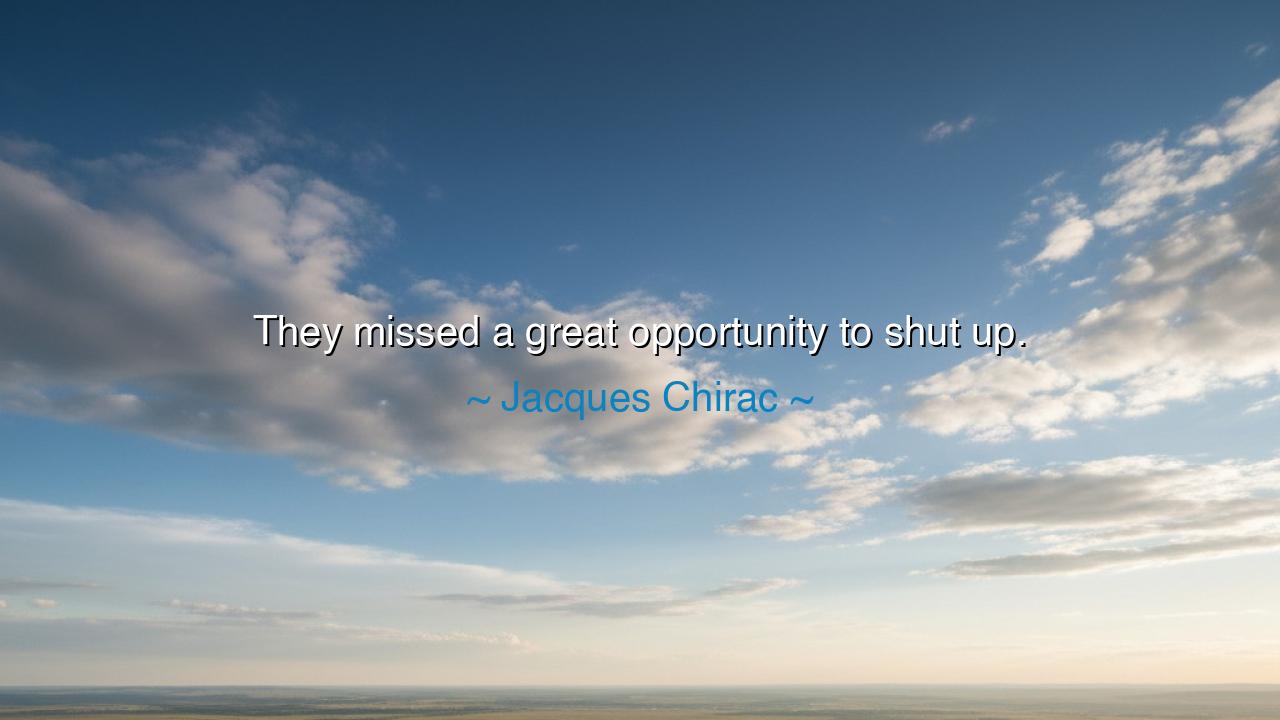
They missed a great opportunity to shut up.






Hearken, O children of reflection, and lend your ears to the words of Jacques Chirac, a statesman seasoned by the tempests of politics, who declared: “They missed a great opportunity to shut up.” At first glance, these words appear as sharp jest, a fleeting remark in the theater of discourse, yet beneath them lies a profound meditation on wisdom, restraint, and the power of silence. The ancients understood this truth well: that speech, though a tool of expression, can also be a weapon of ruin when wielded without thought or temperance.
Chirac begins with the principle of discernment in speech. Not all that comes to mind merits utterance, and not every moment demands a response. To speak rashly, without reflection, is to risk dishonor, misunderstanding, and the erosion of credibility. The philosophers of old, from Socrates to Confucius, taught that silence is a shield, a fortress of prudence that preserves dignity where words might fail. In this light, Chirac’s remark is a reminder that sometimes the greatest victory is achieved not by argument, but by restraint.
The essence of this wisdom lies in the strategic power of silence. To remain still and unspoken in the presence of folly or provocation is often more potent than the loudest declaration. Consider the Roman statesman Cato the Younger, who faced corruption and sedition with steadfast integrity: he chose his words sparingly, allowing the weight of moral conviction to speak where trivial discourse might falter. In this, we see that judicious silence can assert authority more profoundly than speech itself.
Chirac’s phrase also speaks to the danger of unnecessary speech. Words, once uttered, are like arrows loosed—they cannot be retracted. History abounds with such lessons: the ill-timed boasts of Napoleon Bonaparte, spoken in moments of hubris, fueled the enmity that eventually led to his downfall. In every era, those who fail to master their tongue risk that which they cannot regain, for wisdom is often measured in the restraint of the voice.
Yet the quote carries a subtle note of humor, a recognition that human folly is inevitable. Chirac’s remark, delivered with wit, teaches that observation and discernment need not be austere—they can be sharp, even playful, while remaining instructive. Like the ancient court jester who spoke truth cloaked in laughter, Chirac illustrates that truth and prudence can emerge through subtle, well-chosen words—or through the quiet, deliberate choice not to speak at all.
From this reflection emerges a lesson in self-mastery and timing. One must cultivate awareness of the moment, the audience, and the consequences of one’s utterances. Speak when insight and intention demand it; remain silent when words would add no value or might cause harm. In every sphere of life—counsel, diplomacy, friendship—the judicious pause is as important as the eloquent speech.
Practically, this wisdom calls us to consider before speaking. Measure the necessity of your words, reflect upon their impact, and embrace the courage to remain silent when silence serves better than rhetoric. Let your voice be reserved for truth, guidance, or inspiration, and let the rest pass into the quiet, where it harms neither listener nor speaker.
Thus, let it be known: there is honor, power, and safety in silence. Master your words, discern their timing, and embrace restraint, for it is often the unspoken that carries the deepest weight. Walk among others with awareness of the fleeting power of speech, and let your silence at the right moment speak louder than a thousand voices. In this wisdom, you wield the greatest authority, the sharpest insight, and the enduring dignity of prudence.






AAdministratorAdministrator
Welcome, honored guests. Please leave a comment, we will respond soon